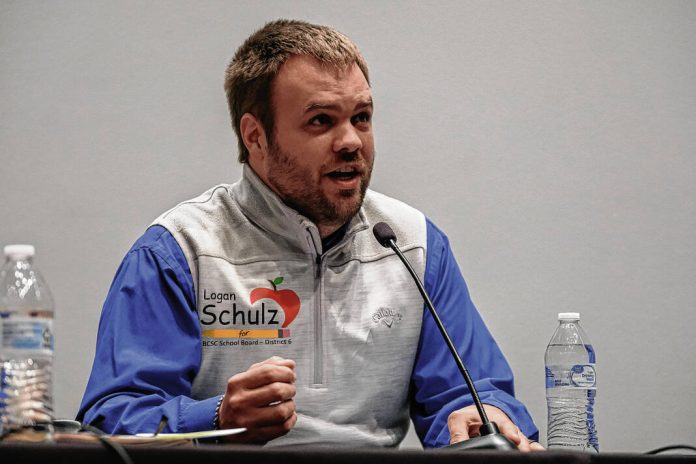
The Republic file photo Bartholomew Consolidated School Corp. District 6 school board member Logan Schulz speaks during a candidate forum in October 2022.
A Bartholomew Consolidated School Corp. school board member is suggesting that school libraries classify certain titles as “controversial” and require parental permission for students to access these materials.
Board member Logan Schulz presented a policy draft at Monday’s public work session, with member Jason Major also expressing his support for the idea. Both men have been outspoken about their concern regarding what they consider inappropriate materials in school libraries and have filed complaints regarding specific books.
“There’s books that are going to be clearly controversial but not to the level of obscene by the statutory purposes, right?” Schulz said. “And at the end of the day, a lot of parents have reached out and said, ‘I want to have a say in my child being able to get that book.’”
His proposal states that if a library material or book meets the definition of controversial, a specific form must be filled out with written approval by the building’s administrator, and the item must be placed in a restricted section. It will then only be made available to students who have signed permission from a parent or guardian.
“Schools can collect written permission from parents/guardians for either general access to this restricted section or collect it on a per material basis,” Schulz wrote. “Documentation of that permission shall be retained in either paper or digital form through the end of the current school year. Permission can be granted for up to one school year at a time.”
He referenced existing Board Policy 2240 — Controversial Issues as providing the definition for controversial. The policy defines a controversial issue as “a topic on which opposing points of view have been promulgated by responsible opinion and/or likely to arouse both support and opposition in the community.”
Schulz also proposed that the form filled out for library books be form 2520 F1, an existing form used to rate materials that are used in the classroom but are not part of the official curriculum. Such materials are to be rated on relationship to the course of study, uniqueness of content/presentation, maturity level and controversial nature. If any criterion rates poorly, the material must be reviewed by the principal.
Existing administrative guidelines state that any library material “that contains content or a manner of presentation that could be controversial, as defined in Policy 2240 and criterion #4 in 2520 F1, should be approved by the principal prior to purchase.”
“Now, in my discussions with the library, they said ‘There’s ways to do it on our systems, to create access requirements, so if you don’t want your child to see hard language books, we can put that into this system,’” Schulz said. “… But at the end of the day, this (policy draft) provides a clear delineation of at what point do we need parental guidance to provide these books.”
He and Major also said that having an “opt out” system — rather than Schulz’s proposal to “opt in” — puts the burden on parents to research books.
However, board president Nicole Wheeldon said that parents can look titles up online.
“If you’re a parent and you feel like you want to limit what your kid sees,” she said, “and you get to the point that you can’t trust them to tell you what they’re checking out, then you have the option to go in and say ‘I have a list. This is what I’m worried (about) and this is what I don’t want.’”
“But you can’t do that for 10,000 books,” Major said.
Wheeldon replied that she thinks having an “opt in” system where libraries separate into two different sections is “impractical” and not realistic.
She added that there’s already statute governing what can be put in libraries, though Schulz said that X-rated material could meet that standard.
He believes it makes sense to seek parental consent for material that “would easily rate above societal norms,” but Wheeldon doubted that the board could agree on what those norms are.
Major stated that he’s previously recommended that BCSC bring together librarians and community members to reach a consensus on what those standards should be.
The subject of library materials has been a hot-button issue at recent school board meetings, both due to interest from the community on both sides of the issue and new legislation. Among other things, the new state law requires school libraries to post a catalogue of their available materials on the school’s website and make a hard copy list available upon request.
Schools must also establish a formal complaint process for parents, guardians and community members to submit a request to remove library materials that are obscene or harmful to minors.
These changes go into effect on Jan. 1, 2024.
BCSC attorney Michael McIver said it’s up to the board to decide how much they want to adopt beyond the minimum standard; however, they need to have at least the minimum in place by the end of the year.
According to Wheeldon, the school board plans to have another work session prior to its regular meeting on Nov. 13, with a tentative start time of 5 p.m.
Where to learn more
More information about existing BCSC policies and proposed updates from education consulting firm Neola is available at bcscschools.org/schoolboard.




